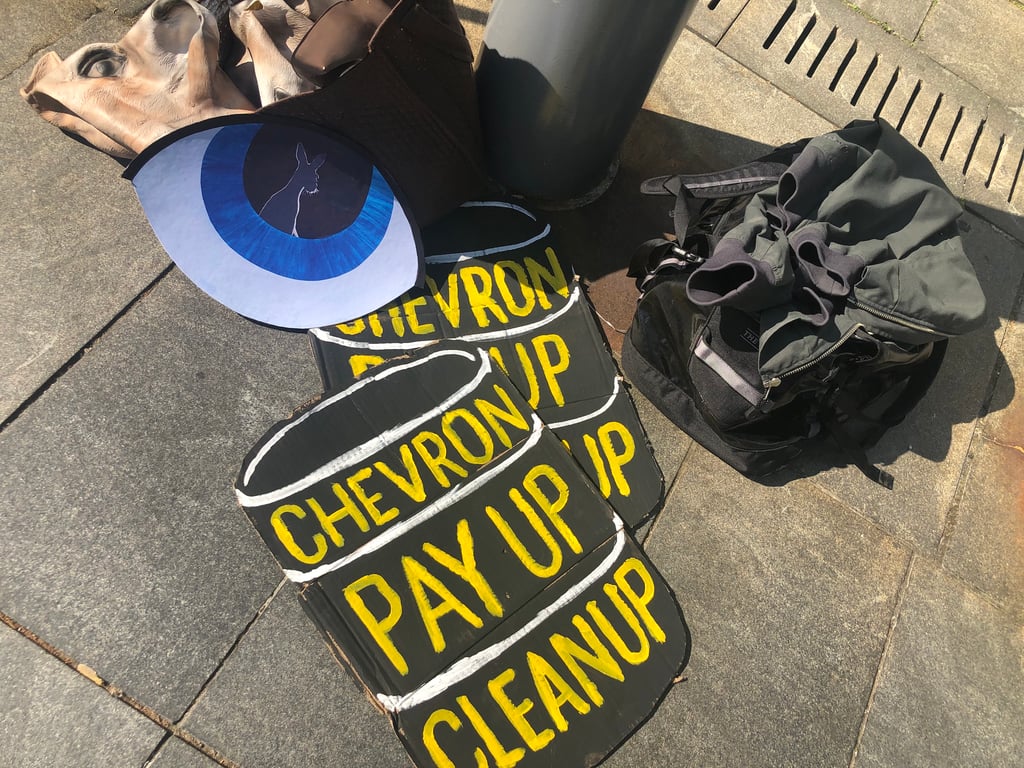MANHATTAN (CN) — The unusual bench trial of an attorney who fought Chevron over rainforest pollution concluded quickly Monday morning after the disbarred attorney’s defense rested without calling any witnesses.
Although Steven Donziger waived his right to testify on his own behalf, his attorney Ron Kuby asked the judge three times to let Donziger make a brief statement that would not be sworn testimony.
Senior U.S. District Judge Loretta Preska repeatedly shut down the request. “You either take the stand or you sit down," she said. “This is not a press conference; either you testify or you don’t.”
Donziger faces up to six months in prison on six misdemeanor counts of contempt of court drafted not by prosecutors but by U.S. District Judge Lewis Kaplan, stemming from the lawyer's representation of indigenous Ecuadoreans living in the oil-polluted Amazon rainforest. After Kaplan ruled that Donziger used fraud to obtain a $9.8 billion verdict in Ecuador against Chevron, he said charged Donziger with violating his court orders.
Kaplan appointed the private law firm Seward & Kissel to lead Donziger's prosecution after the U.S. Attorney’s Office declined to do so, and sent the case to his colleague Judge Preska for a bench trial that began last week. Even though Seward & Kissel represented Chevron as recently as 2018, Donziger failed to head off the trial with his conflict-of-interest claims.
Kuby also leveled unsuccessful bias charges against Judge Preska, who did not give any timetable for her verdict this morning when she closed the trial less than an hour into its fifth day. "Every effort will be do this as quickly as possible," she assured.
In lieu of summation arguments, the George H. W. Bush-appointed judge set a two-week deadline for both parties to submit findings-of-fact and conclusions of law.
Donziger explained his decision to shut down his case in a statement this afternoon, saying “there is no simply no need to further legitimize this Chevron-funded trial any further.”
“I am confident that we more than accomplished our two main objectives: first, we have laid down a solid record for appeal before the Second Circuit,” Donziger wrote. “And second, we have effectively highlighted the structural and procedural unfairness of the nation’s first corporate prosecution designed to criminalize human rights lawyering.”

Outside of the Manhattan federal courthouse Monday morning, attorney Kuby told a crowd of supporters and press that it had been the defense's “hope and expectation” that Donziger would testify, but signals from the judge portended constraints on what she would have allowed him to speak on.
“We spent a lot time preparing for Steven to testify at trial,” Kuby said. “But we’ve also been paying attention to what the court has deemed to be relevant, and nothing that Steven would have to say would be deemed relevant by this court.
“His good-faith efforts to comply with the orders: irrelevant! The Second Circuit’s ruling that his belief was completely reasonable: irrelevant,” Kuby said. “His attempt to act as a lawyer fighting a case from his kitchen table when he had no legal representation and was facing lawyers who were billing over $3 million: irrelevant.
“So given the fact that the judge has so cabined the case to what the judge believes to be the only issues, he simply has nothing to say in that courtroom, and it’s unfortunate but that courtroom is not the last word.”
Kuby noted Donziger’s 650 days of home confinement would not qualify as “the equivalent as jail.”
“You can spend a thousand days on home confinement and yet you have not served a day in jail. Welcome to the greatest legal system in the world,” the famed civil rights attorney proclaimed.
Predicting that Judge Preska would convict him even before the bench trial began last week, Donziger said on Monday he believes he has a “really strong appeal” for the Second Circuit of the expected inevitable conviction.
“The constant clampdown of my ability to defend myself … was palpable throughout the trial,” Donziger said. “And that creates the conditions for a very strong appeal in our view."
Donziger's predictions don't end with the verdict. "I believe her intention is to sentence me to jail so I have to serve six months, and by that time the appeal will be moot,” the lawyer said Monday. “If that happens, I don’t know what we’re going to do. It might just be over at that point, and we move on.”
Some of Donziger’s supporters who gathered outside the courthouse donned plastic kangaroo masks, denouncing the private prosecution and trial proceedings as a kangaroo court.
Donziger’s bench trial happened to conclude on the same day that the U.S. Supreme Court ruled 7-1 in favor of the oil companies BP, Chevron and Exxon Mobil, which are trying to transfer climate change litigation against them led by the city of Baltimore. Where the case will land is still uncertain, but the Supreme Court said the Fourth Circuit must reconsider the ruling that denied federal jurisdiction.
Subscribe to Closing Arguments
Sign up for new weekly newsletter Closing Arguments to get the latest about ongoing trials, major litigation and hot cases and rulings in courthouses around the U.S. and the world.












